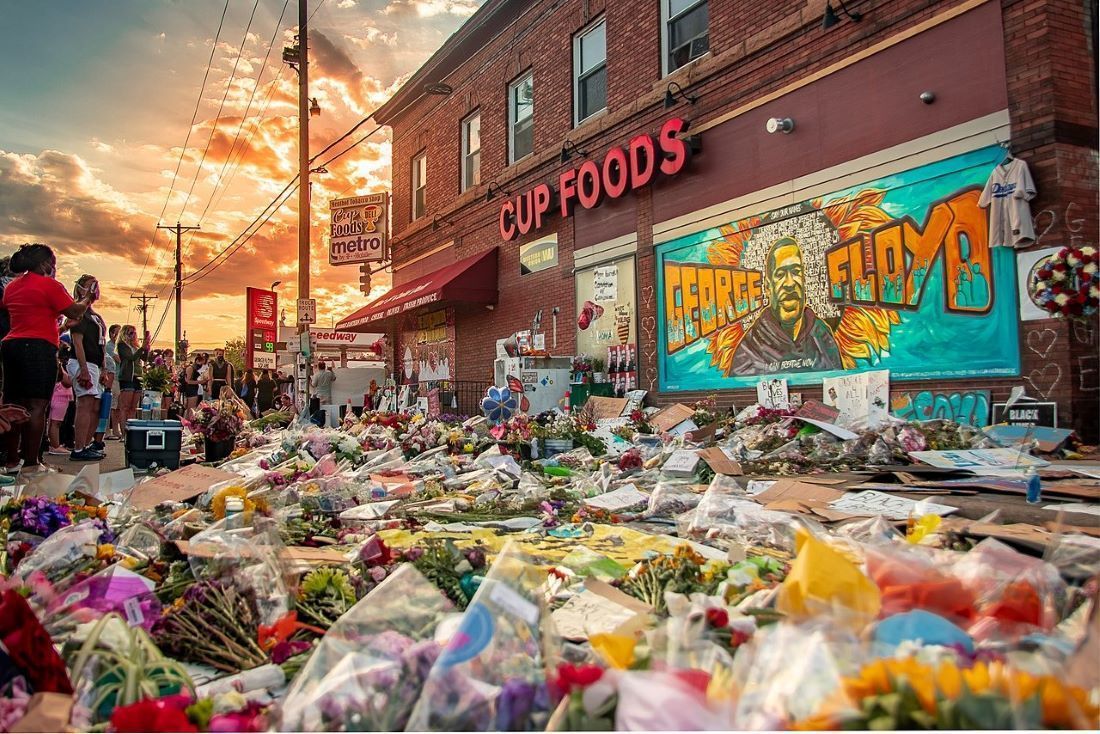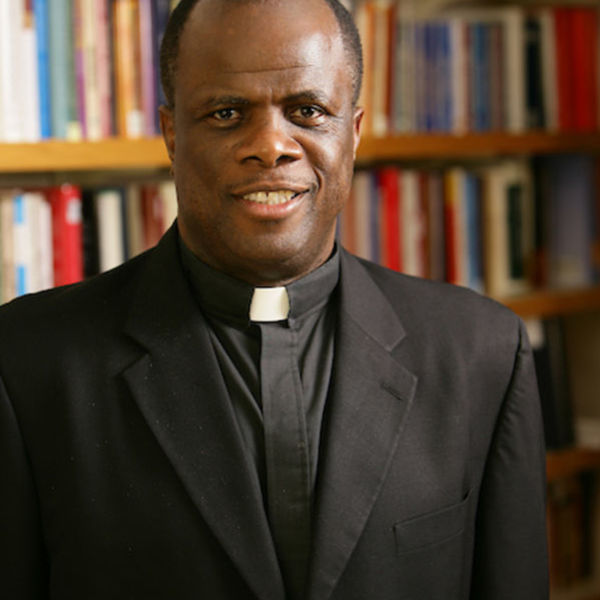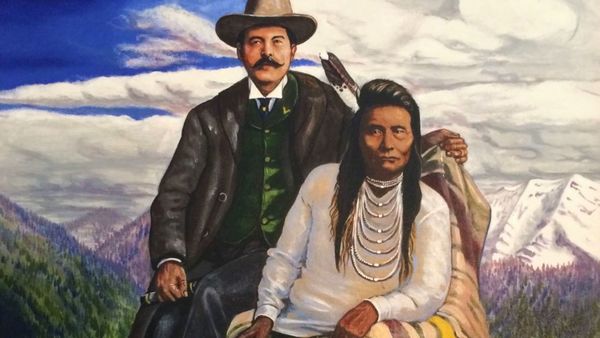The protests which followed the killing of George Floyd by a white police officer in Minneapolis were a collective cry of anguish. This cry came from a place deep within the consciousness of many people, Black and white alike, who were repulsed by the brutality with which George Floyd was treated. For many Black and marginalized people in the U.S.—who, after centuries of segregation and dehumanization, are left feeling insignificant and suffocated—the George Floyd incident highlighted latent memories of their continual struggle for recognition as human beings. The George Floyd murder was thus for them a pointer to a much deeper malaise within American life and society which has been over four hundred years in the making.
George Floyd’s was one of many extrajudicial killings of innocent Black people by mostly white police officers in recent years. Although each of these killings has drawn the ire of many people in the U.S., none of them has elicited as widespread a response as did Floyd’s. The graphic nature of the killing of George Floyd is very hard to comprehend. One would not kill a cat or a dog that way. On a purely personal level, one wonders about the mental and psychological state of the kind of human being who would put a knee on another’s neck and remain oblivious to the anguished cry of pain such as the one Mr. Floyd was making. Equally difficult to comprehend is that fact that the other police officers present were either preventing horrified bystanders from getting close or else standing idly by when it was obvious to them that their colleague was murdering an unarmed and harmless person.
The streets are rising up again after yet more incidents of police brutality interrupted a period when the world was trying to refocus on the COVID-19 pandemic and the ravages it continues to leave around the world. The stench of the atrocious murder of George Floyd still lingers in the air. Following Floyd’s death, concerned persons of all races have vowed to open up more social, political, and economic spaces for Black persons and other racial minorities and to find other ways to attend to those policies and circumstances which negatively affect the wellbeing of these racial groups.
Many also share a commitment to reforming the police force to make it better serve those communities it is currently harming. Some among those calling for reform propose defunding the police. I have read a few accounts of judicious and successful “defunding” of the police, in which communities hire more police of a certain type, reallocate funds to focus on better training and retraining, shift the character of the force toward community policing, institute community-police partnerships and outside oversight boards, and so on. In whatever way this proposal is formulated, it must not include measures that take away valuable resources from police that are needed for the legitimate protection of innocent citizens and for the ability of the police to apprehend and punish criminals. It should also include an enhanced vigilance in the selection, training, and supervision of police officers to ensure that only those who are morally, psychologically, and mentally fit are given police badges and uniforms.
Reactions
George Floyd’s muffled cry of anguish has been heard loud and clear. Governments, individuals, corporate entities and religious institutions have issued statements and made promises to do better in matters of race. The United States Conference of Catholic Bishops (USCCB) issued statements, as have individual bishops, some of whom have even taken the knee in solidarity with and support of the Black Lives Matter Movement.
The Holy Father himself has issued a strong statement condemning the killing of George Floyd in particular and American racism in general: “I have witnessed with great concern the disturbing social unrest in your nation in these past days, following the tragic death of Mr. George Floyd,” he said. He continued, “We cannot tolerate or turn a blind eye to racism and exclusion in any form and yet claim to defend the sacredness of every human life.”
Universities such as Notre Dame have made very strong statements on race that offer specific suggestions on how to move forward. Notre Dame’s President John Jenkins remarked:
The current moment, while deeply tragic, is also an opportunity for reflecting on the ways we can make Notre Dame more fully the community we want it to be and to combat racism wherever we find it. We must seize that opportunity. Yet any successful effort will be one which first considers initiatives that have been undertaken, assesses their effectiveness and builds on what has been successful while replacing or altering initiatives that have been unsuccessful.
While Fr. Jenkins was addressing himself only to the Notre Dame community, I quote him because he is exemplary of the institutional nerves touched everywhere, especially in the Catholic Church, in the aftermath of the George Floyd situation.
I would like to now focus on what the Church must do to move the discussion on race forward. It is my argument that—as well-meaning and well-thought out as these statements and statements of purpose are—they are not enough. Although they are not nothing, they may in the end amount to no more than Band-Aids, palliative measures that seek to soothe the pain but do not get to its source. Every good doctor knows that this is not good medical practice. All the goals outlined in Fr. Jenkins’s letter to the Notre Dame community and other statements from various Catholic institutions are an important first step. But we must do more.
What We Must Do
To get to the bottom of the race question, the Catholic Church must initiate at least a two-pronged conversation on the matter. On the first level, Catholic institutions such as Notre Dame, Georgetown, Duquesne, Fordham, Xavier University, Boston College, and others must combine to discuss the race question in all its complexity. Race cannot be separated from the American experience. We must be willing to have very uncomfortable discussions on this matter yet in a very dispassionate way. Catholic universities across the board are in this experience in one way or another, as are many other institutions outside the Catholic sphere.
However, Catholic universities have something else to guide them that these other institutions do not: the Gospel of Jesus Christ and a unified moral tradition, including Catholic Social Teaching. A Catholic Universities Commission on race would be an important institution that could bring together scholars from diverse disciplines to address this singular issue in the context of the Gospel and CST. Their deliberations would be sustained by contributions from these institutions and from the many learned Catholic philosophical, theological, historical, legal and other societies which dot this country.
Another step in the search for a lasting solution to the problem of race in America would involve the American Church itself. The American Church should muster the courage to hold a national synod on race and racism in all its ramifications. In his book The History of Black Catholics in the United States, the great American Church historian Fr. Cyprian Davis referred to the Catholic Church in America as “a church under chains” because of its involvement in slavery. The American Catholic Church failed to follow Pope Gregory XVI’s condemnation of slavery and the slave trade, In Supremo Apostalatus Fastigio and consequently, according to Fr. Davis,
The Catholic church in the United States found itself incapable of taking any decisive action or of enunciating clearly thought-out principles regarding slavery. This factor unfortunately prevented the American church from playing any serious role until the middle of the twentieth century in the most tragic debate that this nation had to face.
The historical failure of the Church on this issue, as in many others, is loud, clear, and consequently debilitating. This historical fact must not be discounted or swept under the rug. This history notwithstanding, the present moment can in some ways become a kairos moment if we have the courage and the leadership to seize it. We have done it before.
Consider, for example, the controversy about membership in the body of Christ at the very beginning of Christianity. It took the genius and leadership of St. Paul and the rest of the apostles, struggling with this question as they gathered at the Council of Jerusalem, to search out a solution in light of the Gospel of Jesus Christ and to courageously carry it out. Consider also the various Christological and Trinitarian controversies in the Church. By now one is accustomed to the tired refrain that the Church of today is in crisis. This statement implies that there was once a time when the Church lived without crises. Anyone who knows the history of the Church knows that nothing is farther from the truth. The Church was born in strife and continues throughout its history to weather the storms of its age, some of which are the result of its own infidelities and those of its members, while others are imposed on it by the world.
In all these situations we may note two predominant elements that have helped the Church respond to crisis. One of them is the availability of wise, holy, and prudent leaders from both its official leadership and its general membership, who, returning anew to the Gospel of Jesus Christ, try to bring the Gospel to bear on the situation at hand. Herein also lies the second key, which is attention to the Gospel of Jesus Christ, the unchanging truth that anchors the vision and life of the Church. The truth is that the Church is “a vigorous living organism answering new questions with new answers and enlarging the capacity of believers to learn through experience and empathy what love demands.”[1] Renewed encounter with the Gospel allows the Church and its members to answer the challenges of its day, and holds God’s people accountable to his Word.
Racism as Structural Sin
Following St. Pope John Paul II, I would argue that “One cannot easily gain a profound understanding of the reality that confronts us unless we give a name to the root of the evils which afflict us” (Sollicitudo Rei Socialis, §36.3). The one name fitting for racism is structural sin. John Paul II speaks of structural sin as “the sum total of the negative factors working against a true awareness of the universal common good, and the need to further it” and explains that these factors “give the impression of creating, in persons and institutions, an obstacle which is difficult to overcome” (Sollicitudo Rei §36). Structures of sin arise, according to John Paul II, through “the concrete acts of individuals who introduce these structures, consolidate them, and make them difficult to remove. And thus they grow, spread and become sources of other sins, and so influence people’s behavior” (Sollicitudo Rei §36).
In his still very pertinent analysis of structural sin, Gregory Baum like Pope John Paul II speaks of social sin as constituted by “the injustices and the dehumanizing trends built into the various institutions—social, political, economic, religious and others—which embody people’s collective life.”[2] As people in such institutions go about their daily tasks, the dehumanizing trends built into the institutions which guide their lives will damage a growing number and destroy their humanity eventually.
Thus, social sins and the structures they engender usually arise out of inattention and neglect. Although contemporary individuals may not be blamed for the creation of these unjust institutions, they still thrive from participating in them, and have chosen not to see what is going on either because they are benefitting from them, or simply because they are not adversely affected by them. Social sin then becomes a personal sin of omission. And in the Catholic tradition, sins of omission—those sinful situations, sometimes big, sometimes small which one can do something to remedy—are no less sins for which one is held accountable by God.
Slavery is America’s “original sin” and like Original Sin itself, it has bred lethal side-effects in American life, the chief of which is racism. Racism in America has so metastasized that it has in many ways taken control of the system and become “normative.” It has become part of the structure in such a way that even well-meaning and good people are no longer aware of its existence in their lives and attitudes. Something radical must be done if we are serious about addressing it.
A World-wide Question
As I said earlier, the George Floyd killing and the protests which followed it have shown that the question of race, ethnicity and identity, has become a world-wide question, in a way it was never before. In his seminal 1967 encyclical, Populorum Progressio, St. Paul VI proclaimed that “the social question has become today, a world-wide question.” As I indicated elsewhere,
What we are seeing today is a neglected or forgotten aspect of that social question. Today, the question of race, ethnicity, and identity, has become a world-wide question. Consider the question of minorities in Asia, Africa, and the Middle East. Consider the various forms of segregations, caste systems, and other systems of injustice, segregation, and discrimination all around the world. Like the race problem in America, the Church has often paid little or no attention to these situations. We have failed to address them systematically or to deal with them systemically. The recent race riots in America and around the world present us with an opportunity to listen to the cry of anguish of these oppressed minorities and to find ways to shine the light of the Gospel on them. What must the Church do? The Church must devote attention to this issue by convoking a synod which is very well and extensively prepared for in all its aspects throughout the world. Following this synod, the pope must issue a strongly worded exhortation to the world and the Church on this issue, just like he did on the environment.
Here I am calling for two synods and even more. Synods on the race question in American would be seen as an invitation to other countries, in their own ways, to deal with these issues. To refuse to do anything in our time is to be blind, criminally complicit in the situation we have now found ourselves. When we discovered that people from our ranks were abusing children and that some of us in authority or in positions to do something chose to turn a blind eye, we started (or rather, were forced) to begin to think through the issues and grapple with them. The same must be done in this case.
A synod, local or Church-wide, or both, would lay open the roots of world-wide marginalization and discrimination, both ecclesial and secular, and would begin to point us toward some solutions. Such a synod would have to listen to voices within and outside the Church. To refuse to do something is no longer a viable option. Well-meaning one-liners from the pope or from some bishops and college presidents simply will not do any longer. Their words fail to reach to the heart of the matter.
[1] See John T. Noonan Jr., A Church that Can and Cannot Change: The development of Catholic Moral Teaching ( Notre Dame, IN: University of Notre Dame Press, 2005. This quotation comes from the front page of the cover jacket of this book.
[2] Gregory Baum, Religion and Alienation (New York: Paulist, 1975), 201.


